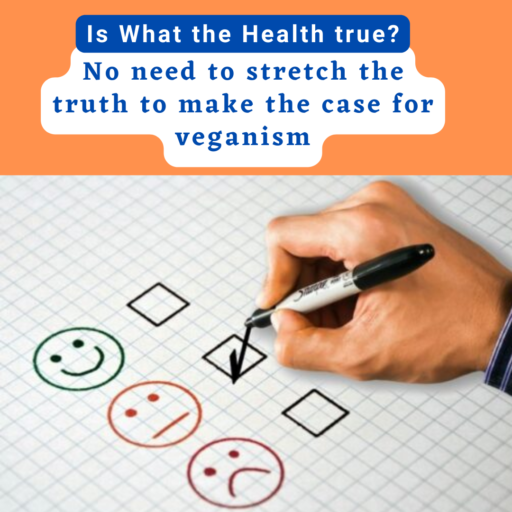Upon its release, the documentary What the Health made waves, inspiring change from some, yet criticism from others. When it’s all boiled down: is What the Health true? In a nutshell, this 2017 documentary gets the basic idea right: we’re far better off on a plant-based diet; however, it exaggerates the truth. Other documentaries present a more reliable source of information advocating for a shift to a plant-based diet.
What it gets right
As the film states, it is true that non-profits like the American Cancer Society accept money from the animal agriculture industry, a balanced plant-based diet counters chronic diseases, and the pollution from factory farming disproportionately harms marginalized communities.
What it gets wrong
However, the film did cherry-pick and misinterpret some data, overstate some conclusions and highlight anecdotal accounts of miraculous healing. Because the producers are lay people, not dieticians or doctors, they do make a number of mistakes in presenting the data they found.
For example, they suggest that a vegan diet is the answer to prevent and treat all chronic disease. They claim that eating processed meats is as dangerous as smoking because both are type 1 carcinogens. However, this classification indicates certainty of correlation, not degree of risk. Eating hot dogs is not as dangerous as smoking, but researchers are as certain that it is linked to cancer development.
They also suggested that dairy intake is linked to hip fractures. While it is true that dairy intake is linked to osteoporosis, a confounding variable in this study is that countries that consume more dairy tend to have icier winters and thus higher rates of falls.
Conflicts of Interest in Counterarguments
Articles claiming that What the Health is entirely false abound. While the film does get some points wrong and overstate the benefits of a plant-based diet, the science indicates that we are undoubtedly better off on a well-balanced plant-based diet. The reviews challenging the science typically report counterargument studies, which often have conflicts of interest.
For example, many studies concluding that cholesterol and fat don’t pose health risks are funded by egg, meat and dairy industries. These industries design studies that seem to exonerate their products. They pay medical organizations tens of billions of dollars to draw conclusions supportive of the industry.
How can we know what’s true?
In this age of misinformation, it’s hard to know what’s true. Sorting out true from false nutrition information can be difficult, as industry studies lobby policymakers and publish studies in otherwise reputable journals. But by looking at whether a study’s sponsors or a spokesperson’s sponsors create a conflict of interest, consumers can determine trustworthiness.
Unbiased Studies
The documentary features Dr. Neal Barnard, who is the president of the Physicians’ Committee for Responsible Medicine. He states that we must return to the science from reliable sources like the NIH, which is unbiased by the animal agriculture or sugar industries. NIH-funded studies of people on a plant-based diet consistently show improved health measures compared to those eating animal products.
Physicians’ Committee for Responsible Medicine (PCRM)
But who, you might ask, sponsors the Physician’s Committee? PCRM has a long relationship with the People for the Ethical Treatment of Animals (PETA). While PETA supports research into the health consequences of eating animals, studies by unaffiliated organizations such as the NIH are on the Physician’s Committee’s side.
Critics of PCRM
Opposing organizations, such as the American Medical Association and the Center for Consumer Freedom, have criticized this association. As always, we must look at the motivations of these critics as well. The American Medical Association is funded by larger sectors of the health care system, including the hospital, insurance and pharmaceutical industries. The Center for Consumer Freedom represents the interests of food companies and restaurants. All of these industries profit from casting doubt on the efficacy of a plant-based diet as a way to prevent and treat disease.
Whose motivation is most trustworthy?
In the same vein, the producers of What the Health are animal rights advocates. They are not transparent with their concern for animals, and Kip Anderson even gives the impression that he is exploring veganism for the first time during the film. They also interview doctors who are animal rights advocates and who have built their careers on vegan nutrition.
When it’s all boiled down, everyone has some motivation. But we must ask ourselves: which motivation is more pure and trustworthy? The mega-corporations who stand to lose a lot of money if consumers cut out their products and stop getting diseases linked to them? Or a group of physicians challenging the medical status quo and people working to end animal abuse?
The best case for veganism is threefold
So, is What the Health true? Only partly. The documentary would have created a more credible case by presenting the incredibly strong correlations between animal products and disease, avoiding anecdotal accounts, and transparently including support from perspectives of the climate crisis, animal rights and other social justice issues.
In her review of What the Health, vegan dietician Virginia Messina, MPD, PhD, states, “Most public health experts recommend a diet that emphasizes plant foods and limits animal foods. But unless you bring in concerns about animals, the environment, and social justice, you can’t make the case for a vegan diet as the only sensible way to eat. The vegan movement’s credibility is undermined when we make claims that are so easily refuted. Why would we want to promote a film that makes our community look like an unreliable source of information?”
Health and disease risk alone leads to the conclusion that “mostly plant-based” is good enough. The iron-clad case for veganism relies on transparent support from all three causes: health, social justice for human and non-human animals, and the urgency of the climate crisis. Taken together, we do not need to exaggerate the evidence from any of them. The case for veganism relies on all three pillars, and that is what What the Health gets wrong.


